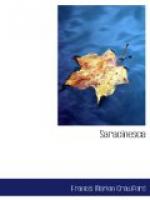“On the other hand, those who own nothing, or next to nothing, are the great majority.”
“Even if that is true, which I doubt, I do not see why the intelligent few should be ruled by that same ignorant majority.”
“But you forget that the majority is to be educated,” objected Del Ferice.
“Education is a term few people can define,” returned Giovanni. “Any good schoolmaster knows vastly more than you or I. Would you like to be governed by a majority of schoolmasters?”
“That is a plausible argument,” laughed Del Ferice, “but it is not sound.”
“It is not sound!” repeated Giovanni, impatiently. “People are so fond of exclaiming that what they do not like is not sound! Do you think that it would not be a fair case to put five hundred schoolmasters against five hundred gentlemen of average education? I think it would be very fair. The schoolmasters would certainly have the advantage in education: do you mean to say they would make better or wiser electors than the same number of gentlemen who cannot name all the cities and rivers in Italy, nor translate a page of Latin without a mistake, but who understand the conditions of property by practical experience as no schoolmaster can possibly understand them? I tell you it is nonsense. Education, of the kind which is of any practical value in the government of a nation, means the teaching of human motives, of humanising ideas, of some system whereby the majority of electors can distinguish the qualities of honesty and common-sense in the candidate they wish to elect. I do not pretend to say what that system may be, but I assert that no education which does not lead to that kind of knowledge is of any practical use to the voting majority of a constitutionally governed country.”
Del Ferice sighed rather sadly.
“I am afraid you will not discover that system in Europe,” he said. He was disappointed in Giovanni, and in his hopes of detecting in him some signs of a revolutionary spirit. Saracinesca was a gentleman of the old school, who evidently despised majorities and modern political science as a whole, who for the sake of his own interests desired no change from the Government under which he lived, and who would surely be the first to draw the sword for the temporal power, and the last to sheathe it. His calm judgment concerning the fallacy of holding a hopeless position would vanish like smoke if his fiery blood were once roused. He was so honest a man that even Del Ferice could not suspect him of parading views he did not hold; and Ugo then and there abandoned all idea of bringing him into political trouble and disgrace, though he by no means gave up all hope of being able to ruin him in some other way.




